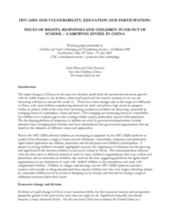China’s rapid modernization over the past two decades has led to dramatic changes for Chinese children. Most children experience massive pressure to study and achieve high scores at school; at the same time increasing numbers of children are becoming vulnerable to emerging forms of exploitation, abuse and harm.
This report highlights participatory research with HIV/AIDS-affected children in Central China, illustrating a full spectrum of issues around changing notions of childhood and vulnerability. In particular this research demonstrates the significant – and growing – inequalities between children in and out of school in China. Notably, both groups of children face distinct vulnerabilities. This study notes that in the Chinese context, excessive burdens placed on children by the education system may constitute a significant barrier to participatory activities designed to promote children's well-being.
This report also highlights the problems faced in the rights-based responses currently at work to protect Chinese children. There is a focus on the dichotomy created by contemporary definitions of vulnerability. These definitions constrain the groups targeted by various children’s organizations, often allowing them to intervene only after it is too late.
The paper concludes that many of these problems stem from a narrow focus on interpreting the rights listed in documents such as the Convention on the Rights of the Child. Holistic approaches demand an analysis of the situation of all children in communities and states, as well as an understanding how populations interact. Moving forward in child protection requires the increased acceptance and spread of children’s participation and the development of ethical approaches to working with children. The results of this work demonstrate that participation is an important factor in building children's resilience and promoting their well-being. Approaches which promote children’s resilience in the face of vulnerability may enable changes in the fulfillment of children’s rights, especially to protection and education.
©Save the Children China

